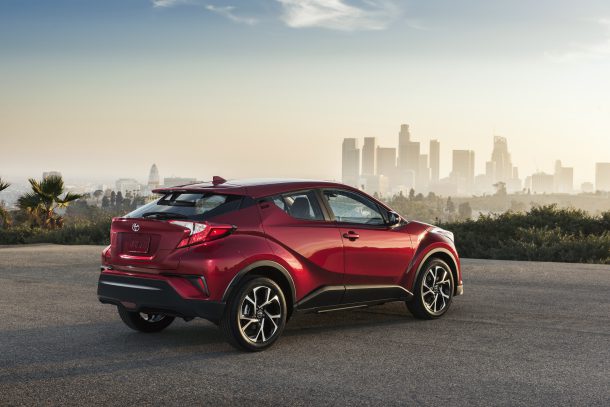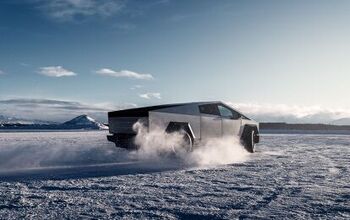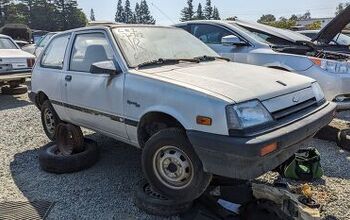Europe's Growing Distaste for Diesel Is Great News for Hybrids - and an Opportunity for Toyota

In the first half of last year, the number of new vehicles sold in Europe with a diesel engine under the hood (or bonnet, depending on your port of call) fell below that of gasoline-powered vehicles.
Spurred on by various tax incentives aimed at boosting national fuel economy, diesel’s popularity hit a high water mark in 2011, with 55.7 percent of all passenger cars sold in Western Europe that year leaving the lot with a compression ignition powerplant. However, since Volkswagen’s debacle, automakers, governments, and consumers are having second thoughts about the fuel.
After seeing the diesel take rate fall 17 percent in 2017, Britain anticipates the overall market share for oil burners could hit 15 percent in 2025. Germany, birthplace of diesel fandom, saw sales sink 7 percent last year, now standing at 38.8 percent of new vehicles. The French take rate is now below 50 percent, as well.
Replacing the incentivized high-torque engines isn’t a job that can be handled by gasoline alone, not in that market, anyway, which is where hybrid vehicles come in. For Toyota, this as much a problem as an opportunity — one that could have an impact on North America.
As U.S. customers know, the automaker already offers a bevy of hybrid vehicles. It’s even a bigger game on the other side of the Atlantic, where Toyota also sells a gas-electric variant of the C-HR subcompact crossover, but very few diesel models. Toyota says it won’t touch the oil burner in the Land Cruiser, as it’s already compliant with the latest EU emissions standards. Besides, what else could it throw in there?
Speaking to Automotive News Europe, Toyota Europe CEO Johan van Zyl said hybrids already account for 40 percent of the company’s European volume. (Russia and Turkey count as part of the region.)
“Our target is to reach 50 percent hybrids in Europe by 2020,” said van Zyl. “Today, the share is close to 50 percent in Western Europe and rises to 60 percent in countries such as France.”
What’s needed to pull off the plan is hybrid powertrains with more power, able to propel larger or sportier vehicles. Despite Toyota’s sensible customer base — a group made up of “rational buyers who look for a favorable total cost of ownership” — there’s more than a few who demand spirited driving, van Zyl said.
So rapid is Europe’s diesel decline, Toyota decided to skip a diesel variant of its C-HR in that market altogether. Overall, Toyota’s Continental diesel share is 15 percent, down from 25 percent just two years ago. The hybrid C-HR represents 77 percent of C-HR sales in Europe. In France, the figure is 90 percent.
“We will decide model by model, but the chances of us launching a new diesel engine in a passenger car or [light commercial vehicle] are limited,” van Zyle said. It’s likely Toyota’s European hybrid push will see new technology, and perhaps new model variants, filter down to its North American lineup, but the automaker would need to carefully weight the market first.
Unlike other automakers, among them Audi and Fiat Chrysler, there’s no plan for 48-volt mild hybrids in Toyota’s portfolio. At least, not on that side of the ocean. Europe needs an electron-heavy approach, van Zyl claims.
Perhaps unfairly, Toyota is seen as a technological laggard for its lack of a fully electric vehicle, despite building the most recognizable hybrid in the world. Rivals like Honda, General Motors, Nissan, Hyundai, and others will gladly sell you an EV right now. Still, while Toyota claims there’s EVs on the way, those models aren’t likely to occupy the bottom rungs of the market. “It’s a matter of cost versus the possible selling price,” said van Zyl, noting that, “It is easier to launch an SUV or premium vehicle as an EV.”
[Image: Toyota]

More by Steph Willems
Latest Car Reviews
Read moreLatest Product Reviews
Read moreRecent Comments
- GregLocock Not as my primary vehicle no, although like all the rich people who are currently subsidised by poor people, I'd buy one as a runabout for town.
- Jalop1991 is this anything like a cheap high end German car?
- HotRod Not me personally, but yes - lower prices will dramatically increase the EV's appeal.
- Slavuta "the price isn’t terrible by current EV standards, starting at $47,200"Not terrible for a new Toyota model. But for a Vietnamese no-name, this is terrible.
- Slavuta This is catch22 for me. I would take RAV4 for the powertrain alone. And I wouldn't take it for the same thing. Engines have history of issues and transmission shifts like glass. So, the advantage over hard-working 1.5 is lost.My answer is simple - CX5. This is Japan built, excellent car which has only one shortage - the trunk space.


































Comments
Join the conversation
Hybrids have a math problem. Most of the gas savings come with city stop and go driving. In the highway they burn close to the same amount of gas. You also have to do enough driving to justify the higher price.
I live next to DC, so heavy traffic. Yes the mileage drops on the highway, but I still get 11 mpg more than my Subaru did. It was fine in the snow, but we hardly get any. Look at Car Questions You Tube video, the RAV4 hybrid struggled on the diagonal test in the snow. When we did get 6+ inches of snow, the Subaru was unstoppable.